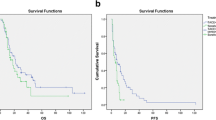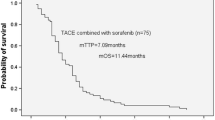Abstract
Background
There is no approved therapy for patients with failed transarterial chemoembolization (TACE) and progression of hepatocellular carcinoma. We aimed to investigate the efficacy and prognostic factors in patients with TACE failure who received sorafenib rescue therapy.
Methods
We investigated 54 patients who met the criteria of TACE failure as defined by the international guidelines of Europe and Japan. Sorafenib was used as a rescue therapy. Overall survival (OS) and progression-free survival (PFS) were analyzed by Kaplan-Meier methods, and multivariate analysis was performed to find prognostic factors.
Results
The patients were followed for a median 5.5 months, and the median duration of sorafenib administration was 3.3 months. The presence of main (or lobar) portal vein invasion (PVI) (3.7 versus 8.4 months, p = 0.004), dose reduction of sorafenib (4.0 versus 8.8 months, p = 0.002) and Child-Pugh class B (5.3 versus 8.9 months, p = 0.004) were associated with shorter OS compared to the presence of segmental PVI (or absence of macroscopic vascular invasion, MVI), full dosage of sorafenib and Child-Pugh class A, respectively. The presence of main (or lobar) PVI was associated with poorer PFS compared to the presence of segmental PVI (or absence of MVI) (2.1 versus 3.8 months p = 0.010).
Conclusions
Sorafenib is a potential rescue therapy in patients with TACE failure. However, the clinical benefits need to be further evaluated for patients with main (or lobar) PVI or those treated with reduced doses of sorafenib.


Similar content being viewed by others
Abbreviations
- HCC:
-
Hepatocellular carcinoma
- OS:
-
Overall survival
- TACE:
-
Transarterial chemoembolization
- AFP:
-
Alpha-fetoprotein
- BCLC:
-
Barcelona clinic liver cancer
- ECOG PS:
-
Eastern Cooperative Oncology Group performance status
- AP:
-
Arterioportal
- EHS:
-
Extrahepatic spreading
- PVI:
-
Portal vein invasion
- MVI:
-
Macroscopic vascular invasion
- CT:
-
Computed tomography
- MRI:
-
Magnetic resonance imaging
- mRECIST:
-
Modified response evaluation criteria in solid tumors
- CR:
-
Complete response
- PR:
-
Partial response
- SD:
-
Stable disease
- PD:
-
Progression disease
- PFS:
-
Progression-free survival
- HR:
-
Hazard ratio
- CI:
-
Confidence interval
References
Giannini EG, Farinati F, Ciccarese F, et al. Prognosis of untreated hepatocellular carcinoma. Hepatology 2015;61:184–190
Marelli L, Stigliano R, Triantos C, et al. Transarterial therapy for hepatocellular carcinoma: which technique is more effective? A systematic review of cohort and randomized studies. Cardiovasc Intervent Radiol 2007;30:6–25
Terzi E, Golfieri R, Piscaglia F, et al. Response rate and clinical outcome of HCC after first and repeated cTACE performed “on demand”. J Hepatol 2012;57:1258–1267
Cheng HY, Wang X, Chen D, Xu AM, Jia YC. The value and limitation of transcatheter arterial chemoembolization in preventing recurrence of resected hepatocellular carcinoma. World J Gastroenterol 2005;11:3644–3646
Li X, Feng GS, Zheng CS, Zhuo CK, Liu X. Expression of plasma vascular endothelial growth factor in patients with hepatocellular carcinoma and effect of transcatheter arterial chemoembolization therapy on plasma vascular endothelial growth factor level. World J Gastroenterol 2004;10:2878–2882
European Association for Study of Liver, European Organisation for Research and Treatment of Cancer. EASL-EORTC clinical practice guidelines: management of hepatocellular carcinoma. Eur J Cancer 2012;48:599–641
Kudo M, Izumi N, Kokudo N, et al. Management of hepatocellular carcinoma in Japan: Consensus-Based Clinical Practice Guidelines proposed by the Japan Society of Hepatology (JSH) 2010 updated version. Dig Dis 2011;29:339–364
Llovet JM, Ricci S, Mazzaferro V, et al. Sorafenib in advanced hepatocellular carcinoma. N Engl J Med 2008;359:378–390
Cheng AL, Kang YK, Chen Z, et al. Efficacy and safety of sorafenib in patients in the Asia-Pacific region with advanced hepatocellular carcinoma: a phase III randomised, double-blind, placebo-controlled trial. Lancet Oncol 2009;10:25–34
Ogasawara S, Chiba T, Ooka Y, et al. Efficacy of sorafenib in intermediate-stage hepatocellular carcinoma patients refractory to transarterial chemoembolization. Oncology 2014;87:330–341
Kondo M, Morimoto M, Ishii T, et al. Hepatic arterial infusion chemotherapy with cisplatin and sorafenib in hepatocellular carcinoma patients unresponsive to transarterial chemoembolization: a propensity score-based weighting. J Dig Dis 2015;16:143–151
Gillmore R, Stuart S, Kirkwood A, et al. EASL and mRECIST responses are independent prognostic factors for survival in hepatocellular cancer patients treated with transarterial embolization. J Hepatol 2011;55:1309–1316
Llovet JM, Real MI, Montana X, et al. Arterial embolisation or chemoembolisation versus symptomatic treatment in patients with unresectable hepatocellular carcinoma: a randomised controlled trial. Lancet 2002;359:1734–1739
Bruix J, Llovet JM, Castells A, et al. Transarterial embolization versus symptomatic treatment in patients with advanced hepatocellular carcinoma: results of a randomized, controlled trial in a single institution. Hepatology 1998;27:1578–1583
Groupe d’Etude et de Traitement du Carcinome Hepatocellulaire. A comparison of lipiodol chemoembolization and conservative treatment for unresectable hepatocellular carcinoma. N Engl J Med 1995;332:1256-1261
Pelletier G, Ducreux M, Gay F, et al. Treatment of unresectable hepatocellular carcinoma with lipiodol chemoembolization: a multicenter randomized trial. Groupe CHC. J Hepatol 1998;29:129–134
Llovet JM, Bruix J. Systematic review of randomized trials for unresectable hepatocellular carcinoma: Chemoembolization improves survival. Hepatology 2003;37:429–442
Seong J, Park HC, Han KH, Chon CY. Clinical results and prognostic factors in radiotherapy for unresectable hepatocellular carcinoma: a retrospective study of 158 patients. Int J Radiat Oncol Biol Phys 2003;55:329–336
Oh D, Lim do H, Park HC, et al. Early three-dimensional conformal radiotherapy for patients with unresectable hepatocellular carcinoma after incomplete transcatheter arterial chemoembolization: a prospective evaluation of efficacy and toxicity. Am J Clin Oncol 2010;33:370–375
Sohn W, Paik YH, Cho JY, et al. Sorafenib therapy for hepatocellular carcinoma with extrahepatic spread: treatment outcome and prognostic factors. J Hepatol 2015;62:1112–1121
Luo J, Guo RP, Lai EC, et al. Transarterial chemoembolization for unresectable hepatocellular carcinoma with portal vein tumor thrombosis: a prospective comparative study. Ann Surg Oncol 2011;18:413–420
Nakano M, Tanaka M, Kuromatsu R, et al. Efficacy, safety, and survival factors for sorafenib treatment in Japanese patients with advanced hepatocellular carcinoma. Oncology 2013;84:108–114
Nojiri S, Kusakabe A, Fujiwara K, et al. Clinical factors related to long-term administration of sorafenib in patients with hepatocellular carcinoma. Cancer Manag Res 2012;4:423–429
Author contribution statement
Do Young Kim and Sangheun Lee participated in the study conception and design. Each author worked on the following tasks: Sangheun Lee, Do Young Kim and Jung Hyun Kang wrote the manuscript. Sang Hoon Ahn and Jun Yong Park collected data and corrected the manuscript. Seung Up Kim and Beom Kyung Kim collected data and participated in study design. Kwang-Hyub Han critically reviewed the manuscript. All authors reviewed and approved the final version of the manuscript to be published.
Author information
Authors and Affiliations
Corresponding author
Ethics declarations
Conflict of interest
Sangheun Lee, Jung Hyun Kang, Do Young Kim, Sang Hoon Ahn, Jun Yong Park, Beom Kyung Kim, Seung Up Kim and Kwang-Hyub Han declare that they have no conflict of interest.
Ethical approval
This study was performed in accordance with the ethical guidelines of the 1975 Declaration of Helsinki. Written informed consent was obtained from each participant or responsible family member after possible complications of the diagnostic procedures and anti-cancer treatments had been fully explained. This study was approved by the independent institutional review board of Severance Hospital.
Additional information
S. Lee and J. H. Kang have equally contributed to this work.
Electronic supplementary material
Below is the link to the electronic supplementary material.
Rights and permissions
About this article
Cite this article
Lee, S., Kang, J.H., Kim, D.Y. et al. Prognostic factors of sorafenib therapy in hepatocellular carcinoma patients with failure of transarterial chemoembolization. Hepatol Int 11, 292–299 (2017). https://doi.org/10.1007/s12072-017-9792-3
Received:
Accepted:
Published:
Issue Date:
DOI: https://doi.org/10.1007/s12072-017-9792-3




